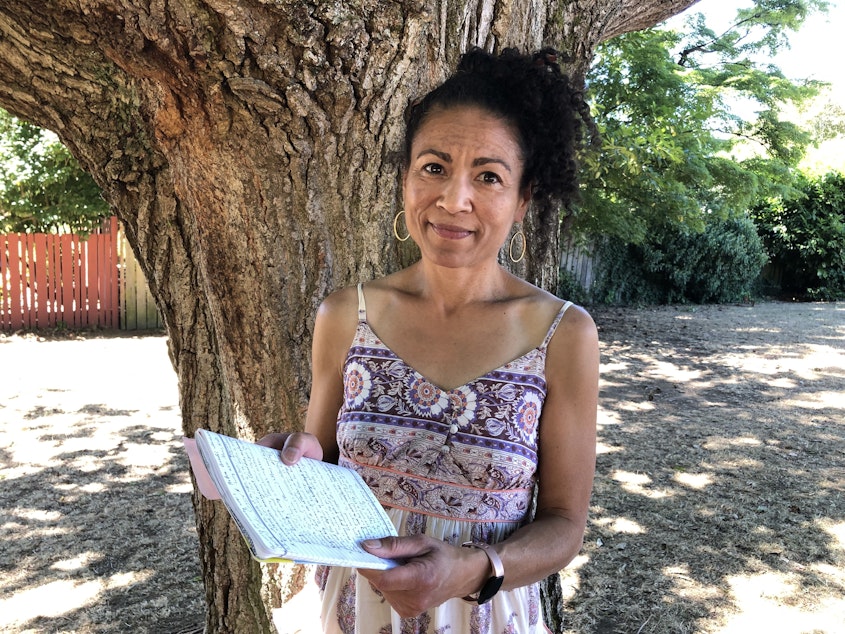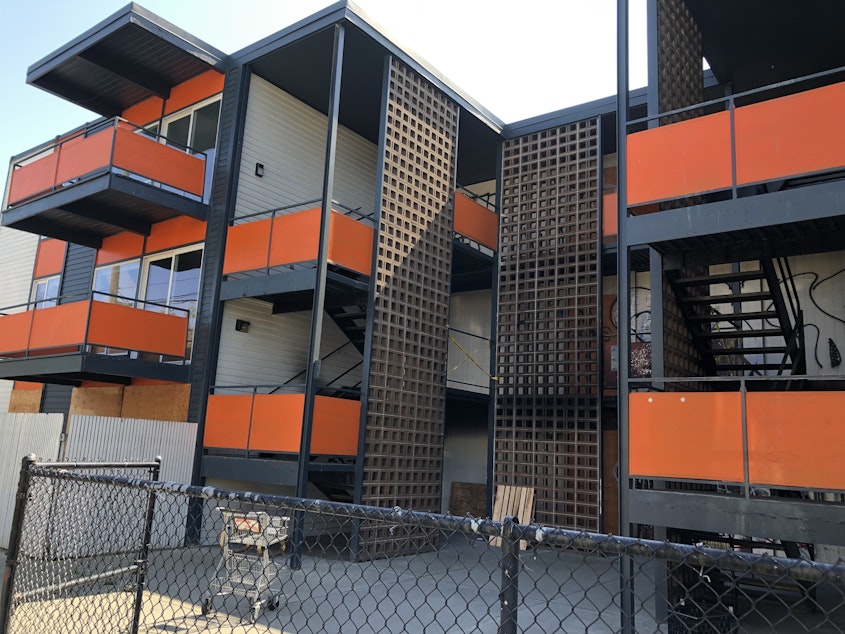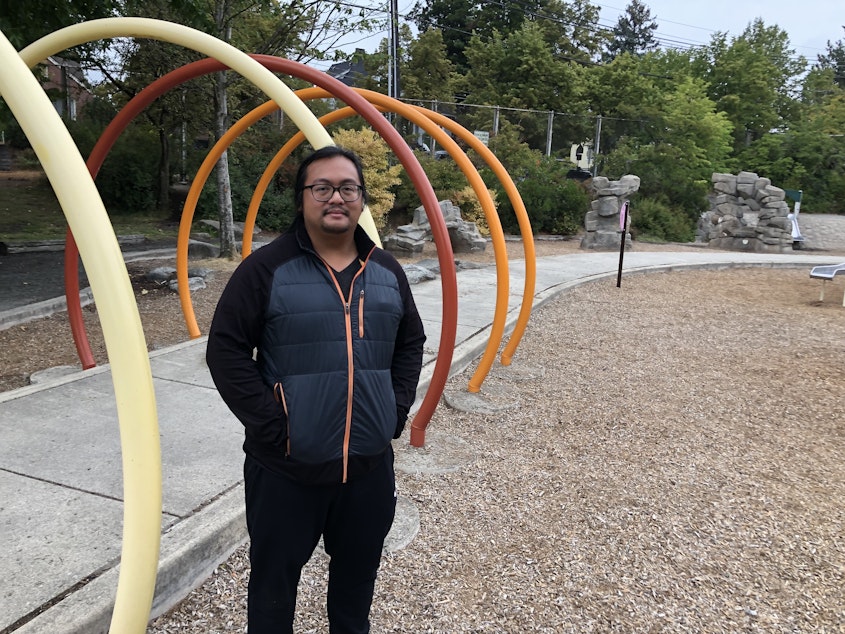She overdosed and no one noticed. Grim realities as Seattle rushes to expand homeless housing

Tara Gary was 51 when she died of a drug overdose. No one found her body for six days.
It happened on July 2, a warm, sunny day in Seattle.
As the city celebrated the holiday weekend, Gary was alone in her apartment at Hobson Place, a low-income housing complex for vulnerable people in the Rainier Valley neighborhood.
Facilities like these are designed to support formerly homeless people with complex needs, with 24-hour staffing and services. That’s why Gary's mother was surprised to learn that her daughter’s death went unnoticed over the Fourth of July holiday.
“You can’t just warehouse people,” her mother said.
Sponsored
Seattle nonprofits are ramping up the supply of publicly funded affordable housing meant to usher people out of homelessness. These nonprofits have increased the number of units for the city’s most vulnerable residents by 59% over the past eight years, to approximately 4,000, according to the city’s Office of Housing.
In promotional videos, the new apartment buildings seem like beacons of progress. But life inside some of these Seattle facilities can be chaotic and dangerous, according to current and former staff and tenants. They told KUOW alarming stories of repeat offenders preying on residents without consequence, and chaos, drug use and noise at all hours.
Housing providers acknowledged to KUOW the acute needs among their residents and said they are working to address them. Academic researchers are also looking at ways to improve outcomes for this population.
“The one outcome that is clear is that this [type of housing] reduces homelessness,” said Ben Henwood, a professor at the University of Southern California School of Social Work, who has studied subsidized housing with wraparound services. “But writ large, supportive housing itself is not a cure-all.”
“Reluctance” to perform welfare checks
Sponsored
Tara Gary's mother told KUOW that her daughter "was a special person." She loved horses as a child, and she grew into a happy young woman with children of her own. Gary seemed to be doing well while living in Oregon in the early 2000s, her mother said. Gary later moved to Seattle, where she slipped into homelessness and faced minor criminal charges for shoplifting and trespassing.
Her mother said she was relieved when Gary obtained housing at Hobson Place shortly after the building opened last year.
Manuela Raunig, a mental health outreach worker who knew Gary, said Gary was popular in her community and loved making art. “She was often just very friendly and talkative,” Raunig said, adding that Gary “had been in a really good place” the last time the outreach team saw her.
In April, Gary was arrested for trespassing and taking $27 worth of soda and energy drinks from a Lowes Home Improvement. Court documents say she was booked into jail on charges of burglary and "numerous unrelated warrants." She was released from the King County jail on June 28. The King County Medical Examiner determined that Gary's fatal overdose from fentanyl occurred four days later in her residence at Hobson Place.
Employees at Hobson Place who spoke to KUOW on the condition of anonymity said her death may not have been preventable. But they said that someone at the facility should have found her body sooner. The building has a policy for staff to check in with tenants every 48 hours. Yet Gary's death wasn't detected for almost a week.
Sponsored
A July 9 email from a supervisor notified staff about Gary's death. “This is not a time to make assumptions and place blame,” the message said. Instead the supervisor outlined a more rigorous policy to do in-person welfare checks at 2 p.m. every day.
Hobson Place is run by the nonprofit Downtown Emergency Service Center (DESC), one of the largest providers of permanent supportive housing in Seattle. The organization's senior director of housing, Noah Fay, would not comment on the details of Gary’s death. “Any time we lose somebody, it is a momentous tragedy for us,” Fay said. “We build really deep, close relationships with people.”
Fay said the organization has stepped up in-person welfare checks.
Still, staff members at Hobson Place described a “reluctance” by employees to perform these checks, saying there’s not enough oversight to make sure people follow through.
Employees at other DESC-run buildings said they often feel like they’re running from one crisis to the next.
Sponsored

Assaults against staff and tenants
Michelle Houk worked for DESC for more than a decade, including at a building called The Estelle, just a few minutes' drive from Hobson Place. Houk had previously been homeless herself, and she found the job of program coordinator rewarding.
“I went through a lot in my own personal experiences with trauma, and so being at DESC really helped me to see what I needed to work on within myself,” she said.
Sponsored
But Houk said sometimes her workplace felt as dangerous as the streets. One time she had hot coffee thrown at her. Another time, a tenant took a swing at her.
“The last time I got assaulted, I was thrown against a counter,” she said. Houk said the woman who hurt her that time was delusional and accused her of “letting rapists into the building.”
Ultimately, Houk left DESC and moved to California.
Other employees told KUOW that, too frequently, residents in DESC buildings have been able to prey on their more vulnerable neighbors with no intervention or consequences. As one example, they pointed to a man who hurt and stole from physically disabled people in Hobson Place.
In July 2021 Hobson Place tenant Rodney Kearney was charged with second-degree robbery. Court documents allege that Kearney entered the apartment of a disabled woman, pinning her to her mattress. He told her he had a gun, and stole her cash.
Seattle police responded to another Hobson Place assault involving Kearney one year later, in August 2022. A resident who uses a wheelchair told police that Kearney punched him twice in the face, stole his cane and broke it. According to the police report, DESC staff said Kearney had already been evicted from Hobson Place two months earlier “for assaulting a janitor with a fire extinguisher."
This August Kearney was booked into jail after building staff told police that he continued to trespass and enter the building almost every day. According to the police report, staff said Kearney “would enter personal rooms belonging to other residents [and] touch other female residents.”
A Downtown Emergency Service Center spokesperson said, “Evicted people do not have authorization and therefore are trespassing if they enter the building.”
Slow responses to fire risks and other crises
Another longtime employee recently left DESC, telling KUOW they no longer wanted to “be a spectator” to what they believed was a lack of urgency in addressing dangerous situations.

The employee, who asked not to be named over fear of retaliation, helped manage DESC's scattered-site housing, including a three-story apartment building leased by the nonprofit in Seattle’s South Delridge neighborhood. That’s where one tenant started lighting fires in his unit last November.
The employee showed KUOW months of emails warning their superiors that the tenant should be moved due to the fire risk, and proposing that he be transferred to respite care or another setting. But that didn’t happen. The tenant continued to start fires in his unit.
On Feb. 12, the tenant started a fire that resulted in a two-alarm response by the Seattle Fire Department.
“The whole back of the building was burned," the employee said, adding that the tenant "was transported to the hospital” with burns. Two pets died and eleven people were displaced. The tenant has been jailed and charged with first-degree arson
"Not only did we fail the tenant, but we failed everybody else in this building,” the employee said.
Today the apartment building sits vacant and boarded up.
Daniel Malone, the executive director of the Downtown Emergency Service Center, said he couldn’t comment on this specific case but suggested that they did try to intervene with the tenant. “We would not be aware of somebody engaging in fire-setting behaviors and not do something about it,” Malone said.
Malone said that too frequently it’s the crisis response system that fails to function, leaving providers like DESC with nowhere to send people as their behavior escalates.
“We’re in a moment right now where the intensity of our work has grown, and that was building for some time, especially as other systems were breaking down,” he said. He said his organization is adding new building features, like real-time alerts when tenants might be at risk of flooding their apartments, and teams to address the acute needs of some of their tenants whose units have repeatedly had to be cleared and treated for bedbugs.
Malone said DESC also helped advocate for more systemic changes like the property tax levy to build new crisis centers in King County. Voters approved that crisis care levy earlier this year. But Malone said, “That is going to be awhile, before we really see the fruits of all that. So meanwhile we’re still out here holding all of this stuff that is more intense than it ever has been. So we’re making other adjustments that we can enact sooner."
Surging needs and barely visible staff
Safety concerns aren’t unique to DESC or to the type of supportive housing they provide.
Last year a cellist and composer named Gretchen Yanover moved into a brand-new apartment building in Seattle’s Roosevelt neighborhood called Cedar Crossing. “It was very beautiful — for a little while,” she said.
Cedar Crossing is intended for tenants on limited incomes, making 30-60% of the area median income. It offers some support services, but is distinct from permanent supportive housing facilities like Hobson Place and The Estelle. It does not offer comprehensive case management or 24-hour staffing, for example.
Yanover thought the facility, which was built to house families with children, would be a good fit for herself and her teenage daughter. But as the building filled up, Yanover said her neighbors were dealing with extremely difficult issues like domestic violence and drug use. Fire alarms were frequent, and staff were barely visible, she said.
"They wouldn’t usually answer the door during office hours,” she said. The building’s two caseworkers left, and their positions remained vacant for several months.
One night, a man tried to force his way into her apartment, Yanover said. She called 911.
“The dispatcher informed me that I was going to have to go out of the apartment and down to the lobby to let the police in the building,” she said. “At which point I started sobbing, because the only safety I felt was behind the deadbolted door!”
Yanover moved out this past summer.

Edelmar Obenza lived at Cedar Crossing during the same time as Yanover, with his wife and two young children. He echoed Yanover’s concerns with the building. “Safety was always at the forefront," he said.
His family also left as soon as they could find another option.
Obenza and Yanover formed a Facebook group called Humans of Cedar Crossing to help residents build community, but said the needs in the building quickly exceeded what they could offer.
“I wish folks who had that hardship would have more support,” Obenza said.
Susan Boyd is the CEO of Bellwether Housing, the nonprofit that manages the Cedar Crossing building. She said the facility had a difficult first year.
“We took some chances on housing people that had some pretty serious mental health issues, substance use disorder, and for the most part those risks have paid off and we have a lot of people living really stably there,” Boyd said. “But we’ve also had a handful of residents who have had a really hard time there.”
Boyd says about half of the tenants at Cedar Crossing are coming out of homelessness or deep housing insecurity.
“That wasn’t necessarily the intended population, but that is what happened, there was obviously a lot of need for that,” she said.
Bellwether’s partner in the project is a nonprofit provider called Mercy Housing, which is in charge of the caseworker positions and family programming. Mercy said the two open positions have since been filled.
But Boyd says there’s still a huge need for more tools to help tenants who are struggling.
Looking to the future
Seattle’s proposed housing levy, on the ballot this fall, will direct $122 million not just to operate and maintain affordable housing, but to pay staff for tenant services as well.
Kelli Larsen, head of strategic initiatives for Seattle’s Office of Housing, said providers advocated for that funding.
“There has been a need, as we are building the buildings, to utilize our dollars to properly support the operating, maintenance, and services that you need every single year,” Larsen said.
Larsen said $34 million of that funding would be allocated to raise salaries for staff in buildings like Hobson Place.
“That’s exclusively for permanent supportive housing projects,” Larsen said. “The aim is to support workers on the front line and their supervisors, everyone who’s a direct service staff, to raise wages and really improve the situation that we’re seeing.”
Officials with the Downtown Emergency Service Center said they have already raised their lowest wage to $29 an hour, and are on track to have their lowest turnover rate in years. They say that will help strengthen relationships between tenants and caseworkers, for example.
But Michelle Houk, who quit DESC and moved to California, said what she really wanted was a safer workplace.
“I got paid the best at DESC, I got the best [paid time off] at DESC, I got the best insurance at DESC. But that didn’t help the trauma,” Houk said.
Providers say some of the chaos described by staff and residents come from factors outside their control. Tenants have strong legal protections in Seattle, and evicting them goes against the mission to prevent homelessness. Government funding is contingent on providers offering a Housing First model, in which participating in services is voluntary and residents can’t be required to abstain from drugs or alcohol as a condition of obtaining housing.
So far, research finds that these types of low-barrier housing have not demonstrated a significant impact — good or bad — on residents’ overall outcomes related to mental health or substance use. Ben Henwood, the professor at University of Southern California, said researchers are trying to understand those results.
“And especially knowing that housing is such a social determinant of health, it’s like, why aren’t we seeing better outcomes?” Henwood said.
Academic researchers are considering ways to improve those outcomes and promote social integration for formerly homeless people.
Henwood said researchers are also looking at the services people receive when they gain housing. "Intensity of services matters," Henwood said, "And also the training and skill of the support services.”
He said that, moving forward, cities should strive for an adequate supply of affordable housing, and then a flexible array of services, with smaller caseloads so staff and clients can really connect.
Henwood also noted that the same problems that afflict tenants in supportive housing occur in the population as a whole — these are simply sites of "concentrated disadvantage," he said.
Staff and tenants say they want to see strong services and interventions that will make Seattle’s supportive housing feel safer for all.
10/18/2023: This story has been updated with more details around Tara Gary's arrest.



